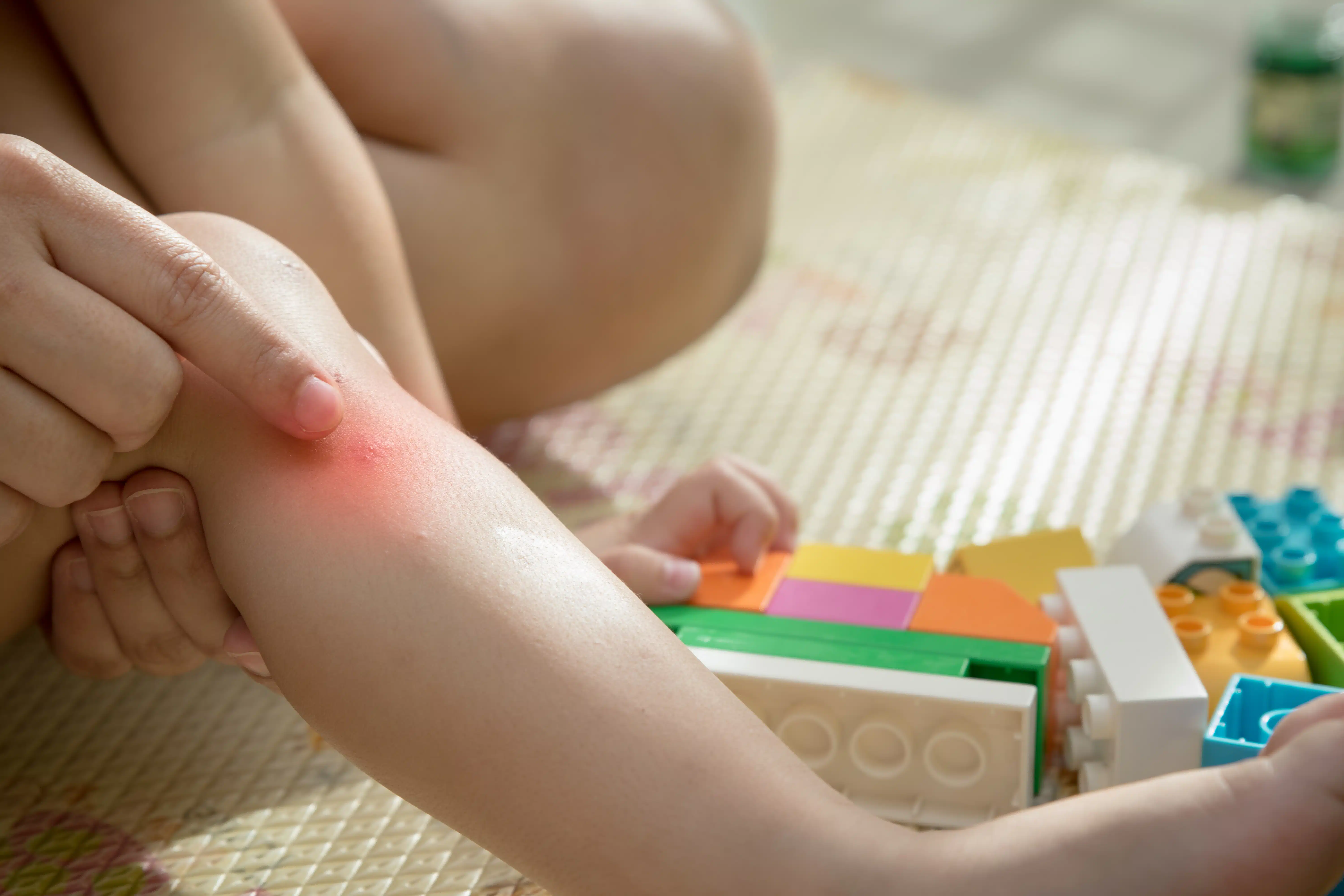How to Stop Bug Bites from Itching – Natural Relief
By: EarthKind
Counting the itchy red bumps that dotted our arms and legs was something of a summer ritual when I was a child. At the time, things like West Nile virus and Zika weren’t even on my radar. Now as a parent, the sound of mosquitoes buzzing in our ears and the sight of kids scratching a bug bite cause a bit more worry.
In this article, we go over different bite types, DIY relief of itchy bug bites, and when an insect bite may require medical attention.
What’s Biting Me?
When you can’t stop scratching and you’re looking for a specific target to blame for your pain, the usual suspects, like mosquitoes, are a good place to start. Keep in mind that mosquitoes aren’t the only bothersome bug out there. Here are the common culprits in the US:
Mosquito bites are common anytime you’re outside, especially in the summer near water. When bit by one of these pesky insects, a bump often appears that can itch for numerous days. Keep a mosquito repellent close by when you’re spending any time outdoors.
Spiders prefer quiet, undisturbed areas. Watch out for spiders when you’re returning to a summer cabin that has been sitting vacant, or when you are getting something that has been left in storage for a while.
Ticks prefer warm, but shaded environments such as leaf piles and forest brush. Watch out for them when you are camping, hiking, or even just walking your dog outside.
Ants are mostly just a nuisance, but look out for fire ants if you are in the South and Southwestern states. Ants live in colonies and will swarm anywhere there is a food source, indoors or out.
Stinging insects, like bees and wasps, can often be found outside during warm weather. They are attracted to bright colors as well as sweet food and drinks because those are the characteristics of the flowers they prefer.
More often than not, the worst after-effect of an insect encounter is just itching and scratching.
Home Remedies for Itchy Bug Bites
Instead of running to the drug store, you can find natural alternatives in your kitchen or garden to help you stop scratching these irritating bumps. Try these home remedies for relief:
- A cool, damp green tea bag will soothe the itch and reduce inflammation.
- Rub a basil leaf on the bite; basil has anti-inflammatory properties.
- Peppermint — a dab of toothpaste, a drop of peppermint essential oil, or a fresh leaf straight from the plant can all do the trick.
- Cucumber can help soothe the hot feeling that may accompany a sting or bite and help relieve the itch.
- Ice pack or cube will provide a cooling sensation that can help lessen the itch.
- Pinching; your brain can only focus on one type of pain at a time, so a quick pinch will take your mind off the itch.
- Aloe Vera on the affected area could help provide itch relief and is also beneficial for your skin.
- Honey, neem oil, and tea tree oil all have healing properties and will help fight infection.
If you (or your child) can’t quit scratching, try putting a Band-Aid or invisible tape on the bite to make the spot harder to reach.
When to Worry About Bug Bites
Natural remedies don’t always work, and in some cases further advice from a medical professional could be necessary.
A raised red bump at the site of a bite is normal, so is itching and temporary or minor swelling. In most cases, symptoms disappear within a few days and no medical attention is needed.
Allergic reactions or persistent symptoms may require medical treatment. Be on the lookout for these warning signs:
- Wheezing, shortness of breath
- Chest pain or tightness
- Sensation of the throat closing or difficulty speaking or swallowing
- Faintness, weakness, or loss of consciousness
- Nausea or vomiting
- Muscle spasms
- Rapid heartbeat
- Fever
- Infection
Signs of an allergic reaction will appear almost immediately after the bug bite happens. If you are feeling ill days after a bite, you should follow up with your doctor. Mosquitoes, ticks, and other bugs can transmit diseases to people like Lyme disease or West Nile Virus. Here’s some detailed information about diseases spread by mosquitoes and their symptoms.
Why Me?
If you’re curious why these insects bite you in the first place, here are a few possible reasons.
Spiders, ants, and stinging insects only bother or bite a person who disturbs their nest, their food, or makes them feel threatened (you may unintentionally threaten a pest by reaching your hand into a place where it is hidden, like when grabbing something out of storage). Most of the time, insects are aware of the fact that we are much bigger than they are and we are more of a threat than anything else to them. They would be happy to leave us alone if we left them, and their food sources alone.
Insects that feed off of blood, like mosquitoes and ticks, are a different story. Ticks wait patiently in tall grass and brush for a person or animal to walk by and then they “quest” onto a host — ticks cannot jump out of a tree or fly onto a person, but they will climb onto you if you come into contact with grass or leaves they are hiding in. Mosquitoes find people to bite by following the smell of the carbon dioxide you exhale when breathing. They are attracted to dark colors and people who have been exercising because you exhale even more carbon dioxide and there’s lactic acid in your sweat.
Next time you plan on spending time outdoors, remember to wear light colors and cover up as much skin as possible to help prevent itchy bites. Check out Stay Away® Mosquitoes, our unscented, skin-friendly insect repellent.







